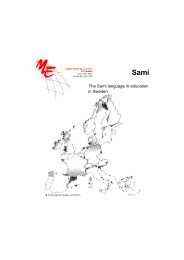Multilingual Early Language Transmission (MELT) - Mercator ...
Multilingual Early Language Transmission (MELT) - Mercator ...
Multilingual Early Language Transmission (MELT) - Mercator ...
Create successful ePaper yourself
Turn your PDF publications into a flip-book with our unique Google optimized e-Paper software.
equires a heightened attention on the part of both mothers and fathers towards the<br />
specific language they think their child is attempting to speak in. Parents can help the<br />
bilingual development process by teaching children words in two languages. This can most<br />
easily be embedded in book reading sessions, where a book is read in the minority language,<br />
and occasionally parents say things like: "and at school they call this a Zug, but here at home<br />
we say trein" (Zug = German for train; trein = Dutch for train). Book reading is actually an<br />
excellent way of supporting minority language development, and should be started when<br />
children are about 6 months old.<br />
It is not easy to support early bilingual development. It requires a lot more work and<br />
attention from young parents, who may be overwhelmed by child rearing as it is. All the<br />
more reason to garner support from grandparents and other relatives and friends who can<br />
speak the minority language and ask them to play and interact with the young bilinguals-tobe.<br />
Such trans generational and community support is paramount for minority language<br />
survival.<br />
Notes<br />
(1) Although much of what I write here most probably relates to trilingual settings as well, I<br />
focus on the development of just two languages. There has been insufficient research on<br />
early trilingual development. Yet, the statements in the first paragraph apply to trilingual<br />
settings as well.<br />
(2) I have chosen to situate the examples in Brittany, Finland, Friesland and Wales (in this<br />
alphabetical order). The fact that some examples are more positive for a region and others<br />
more negative is entirely coincidental.<br />
(3) They can, of course, go on to learning other languages, including the minority language,<br />
later on in life. The latter appears to be quite uncommon, though.<br />
99



